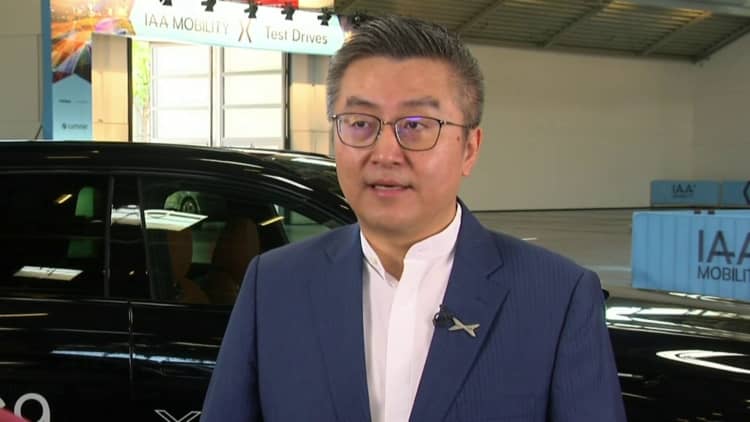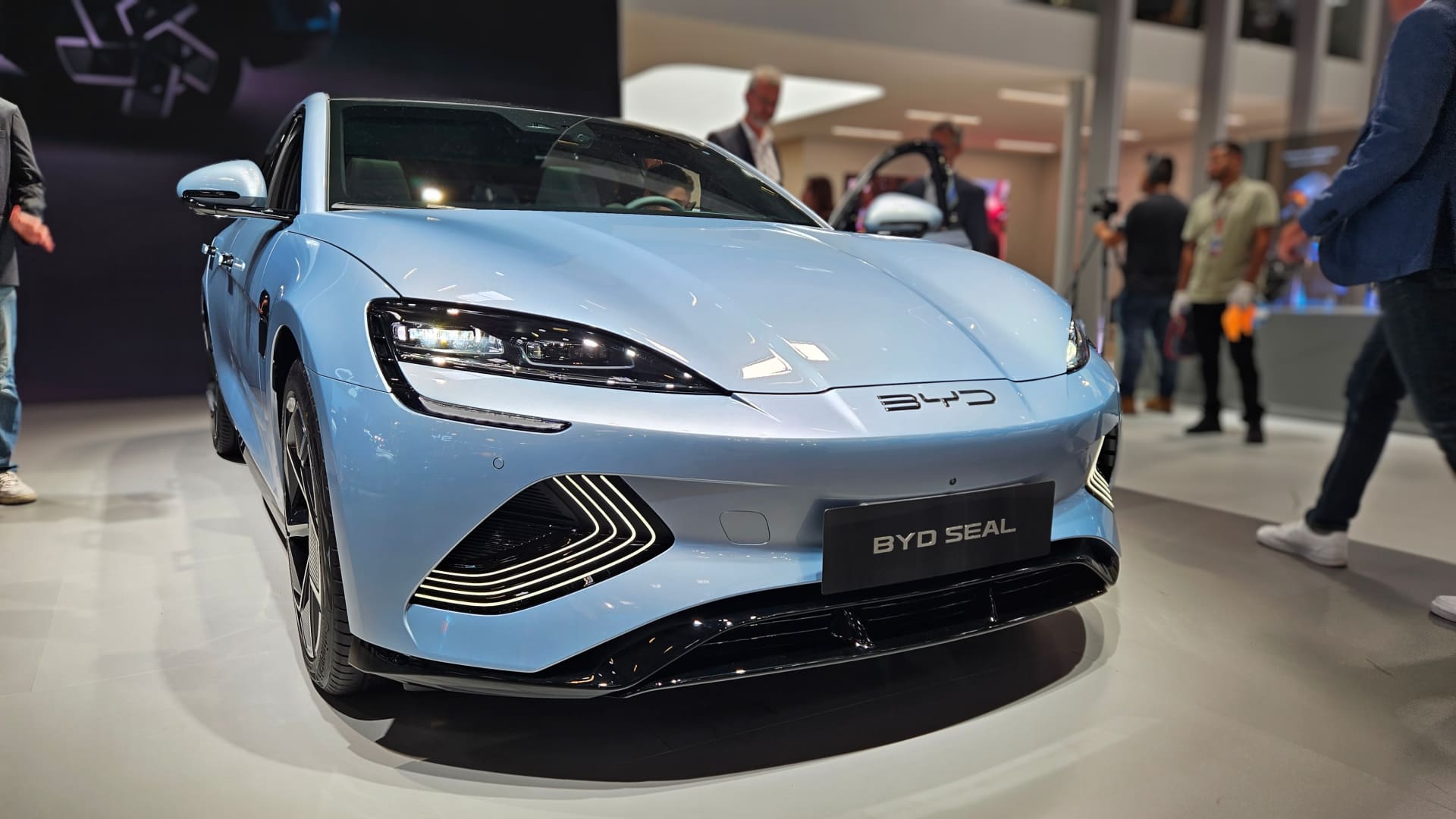BYD launched the BYD Seal in Europe at the IAA auto show in Munich, Germany. The electric sedan has a starting price of 44,900 euros ($48,479).
Arjun Kharpal | CNBC
Munich, GERMANY — The IAA in Munich, Germany is one of Europe’s most high-profile auto shows. And it was dominated by Chinese electric car firms looking to expand their presence on the continent and challenge incumbents from BMW to Ford in the new era of battery-powered vehicles.
Chinese start-ups and players had some of the biggest stands at the event with high-profile press conferences and vehicle launches, underscoring their intention to make a splash in the European market.
China, the world’s largest EV market, has seen a tidal wave of electric car companies pop up in the last few years, driven by government subsidies and venture capital funding. But a slowing market at home, due to tepid consumer spending after Covid-19 restrictions were lifted, coupled with an attractive market in Europe, has seen Chinese firms launch cars abroad and expand their footprint.
“Europe is one of the largest (second after China) mass market vehicle markets … If the Chinese EV makers want to secure a growth path beyond their local market, its very logical to look at Europe,” Daniel Roeska, senior research analyst at Bernstein Research, told CNBC via email.
Roeska added that Europe, with its “stringent de-facto” ban on combustion engine cars in 2035, “is pushing the market faster towards EVs at a time when most EU brands … do not have a perfect offering yet, making market share gains easier.”
Many of the European carmakers have been seen lagging in their push into EVs at a time when Chinese players have launched dozens of new vehicles.
China makes mark in Munich
The ambitions of Chinese EV firms were on display at the IAA.
On the morning of the first day, Leapmotor, a Chinese firm headquartered in Hangzhou, announced plans to bring its C10 sports utility vehicle, or SUV, to European markets next year. In the next two years, the company said it plans to introduce five “globally-oriented” products across the world.
“All of Leapmotor’s subsequent products will be designed and developed with a global mindset and adhere to global standards,” Leapmotor CEO Zhu Jiangming said at a press conference on Monday.
Chinese EV maker Leapmotor launched its first car for the international markets called the C10.
Arjun Kharpal | CNBC
Meanwhile, BYD, the carmaker backed by Warren Buffett, launched its Seal electric sedan for Europe on Monday, starting at 44,900 euros ($48,479). For comparison, in Germany, Tesla’s Model 3, starts at 42,990 euros.
And there were more announcements about continued expansion into new territories.
Xpeng said Monday it will expand sales of its cars into the German market in 2024. The company currently sells its P7 sedan and G9 SUV in Norway, Sweden, Denmark and the Netherlands. And Brian Gu, president of Xpeng, said the company plans to bring its latest car, the G6, to Europe next year, underscoring the Guangzhou-headquartered firm’s global push.
“We recognise Germany is the most important and the highest standard market for all” carmakers, Gu told CNBC in an interview Monday.
“And to be able to be here and then really made our make our product available to the customers in this market, really will help us further penetrate the continental European market. We have ambitions for broader market coverage internationally.”

The entrance of Chinese firms into Europe is seen as a threat to big automakers who have been perceived to be moving too slow on EVs.
Analysts at Bernstein said in a note published in June that if Chinese carmakers enter the market “as per normal,” then incumbents may concede up to 5% market share by 2030. But these new entrants could grab up to 20% market share if their entrance into Europe is more aggressive than expected, they added.
Price war and rising competition
But the Chinese companies themselves face rising competition from within, but also outside of their home market. Tesla sparked a price war earlier this year which has put pressure on profits and margins of some of China’s smaller players like Xpeng.
Meanwhile, to fend of rising competition and catch up with Tesla, BMW and Mercedes both launched a dedicated electric car platform that will underpin their vehicles for the coming years, adding further potential headwinds that are not lost on these Chinese challengers.
“Well, it is definitely not easy,” Xpeng’s Gu said of the push from traditional carmakers into EVs.
“I think as a young company, we also are trying to learn from … each step that we take, as well as learn from the competition, the partners that we have. But we have confidence in our technology, we have confidence in our product,” Gu added.
Chinese automaker BYD had one of the biggest stands at the IAA show in Munich, Germany in 2023.
Arjun Kharpal | CNBC
Another challenge for the Chinese firms is building brand recognition, an exercise that could stretch marketing budgets and take a long time to do.
“Brand is a sizeable issue, but not insurmountable if they can invest for the long-term,” Peter Richardson, vice president at Counterpoint Technology Research, told CNBC via email.
Richardson said Korean firms Hyundai and Kia were “relatively unknown” in Europe 30 years ago, but “both brands have risen to be significant players.”
“It takes time and dedication,” Richardson added.

